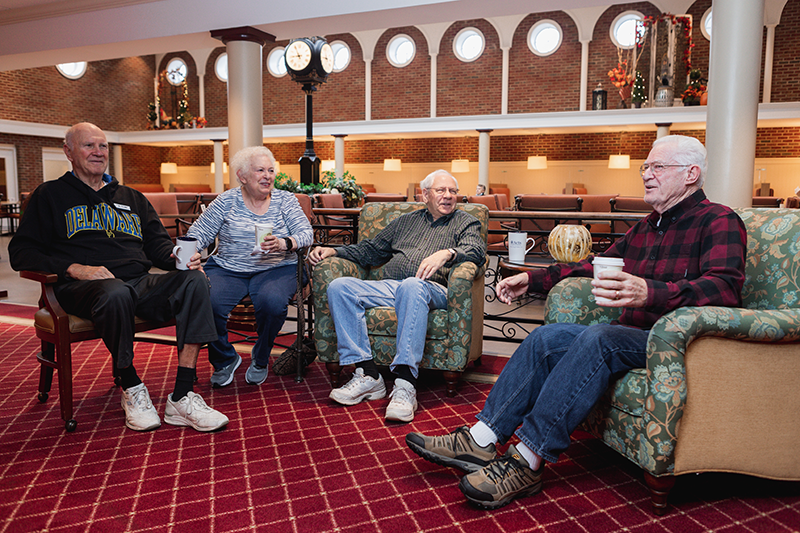The Loneliness Epidemic in Senior Citizens
Loneliness is a growing epidemic in the United States. According to a 2018 survey by the Cigna Well-Being Index, nearly half of all Americans (46%) say they sometimes or always feel lonely. This number is even higher among older adults, with 61% of adults aged 65 and older reporting feeling lonely. In fact, older adults are often the most susceptible to loneliness for a myriad of reasons, especially those who have moved into retirement.
Loneliness isn’t just a state of mind, either. Not having enough social interaction can have a significant impact on physical and mental health. Studies have shown that loneliness can increase the risk of heart disease, stroke, dementia, depression, and anxiety. It can also shorten lifespan. In fact, one study found that loneliness is as harmful to health as smoking 15 cigarettes a day. Therefore, while this loneliness epidemic can of course have a major impact on anyone, older Americans may be the most at risk.

What Contributes to Loneliness in Seniors?
There are a number of factors that can contribute to loneliness among retirees and particularly in older generations. Some of these factors include the act of retirement itself, as this can lead to a loss of social connections. When people no longer have the same opportunities to interact with co-workers and friends that they would normally see every day, it’s easy to go long stretches without meaningful interaction, which makes it easy for loneliness to set in.
Likewise, the death of a spouse or loved one can be a major source of loneliness in senior citizens. These feelings of loneliness can be even more severe if the relationship has been a long one.
Another facet that can contribute to loneliness in the elderly community is moving to a new place. This can make it difficult to make new friends and build social connections, leading to increased feelings of isolation.
An additional contributing factor is health problems. Limitations to your ability to get out and about, or difficulties in doing so, can further isolate someone by restricting them to their home, leading them to feel isolated and lonely.
How to Address the Loneliness Epidemic
Loneliness in seniors is a major problem, especially for those of us who have reached retirement age. Yet just because the effects of loneliness are severe doesn’t mean there aren’t ways to combat it. There are, in fact, a number of things that can be done to address the loneliness epidemic in older adults. One example encourages older adults to stay active and engaged in their communities. This could involve volunteering, taking classes, or joining clubs or groups.
One of the reasons this approach works so well is that it promotes social interaction among older adults. This can lead to new friendships and result in organizing social events, such as potlucks or game nights. By the same token, caregivers of older adults can play an important role as well. Providing support for caregivers is integral as their presence can help to reduce loneliness in older adults facing health or mobility limitations.
Finally, and perhaps crucially in addressing the loneliness epidemic: it’s essential to educate the public about the dangers of loneliness. By raising awareness of the issue, we can help to break down the stigma associated with loneliness and encourage people to seek help if they are feeling lonely. There is help out there for people struggling with feelings of loneliness, but because of the associated stigmas of social isolation, too many individuals never reach out. Working to end this tragic circumstance will do much to improve the lives of not just older adults but anyone who suffers from loneliness.

Even More You Can Do to Combat Loneliness
These aren’t the only things seniors can do to combat loneliness. In addition to the supportive actions listed above, here are some specific tips for older adults who are feeling lonely:
- Reach out to friends and family. Make an effort to stay in touch with people you care about, even if it’s just a phone call or a quick text message. It’s amazing how even a short hello can raise your spirits. Plus, it’s likely that the person on the receiving end will feel better after a chat or a message as well.
- Get involved in your community. Volunteer, join a club or group, or take a class. This is a great way to meet new people and make friends. If you live in a retirement community, make use of the amenities and programs there, as these places are designed to support and encourage social interaction.
- Take care of yourself. Make sure you’re eating healthy, getting enough exercise, and getting enough sleep. Also, don’t put off doctor visits but attend regular checkups instead. This can help to improve your mood and energy levels. Plus, the healthier you are, the more you’ll be able to enjoy your retirement.
- Seek professional help if needed. If you’re struggling with loneliness, don’t be afraid to seek professional help. There’s no shame in doing so – in fact, it’s one of the healthiest things you can do for yourself. A therapist can help you to understand the root of your loneliness and develop strategies for coping with it.
- Join a retirement community. Related to an earlier point, if someone is feeling lonely living alone in their family home, a terrific solution is to move to a community of other retirees. You will be surrounded by people all the time, with easy access to activities such as game nights, shared hobbies like art studios or woodworking shops and associated classes, group activities at fitness centers and swimming pools, and much more. You can be as much or as little engaged as you want. Learn more about terrific retirement community options.
The Loneliness Epidemic Among Older Adults
Loneliness is a serious problem that can have a significant impact on the health and well-being of older adults. By taking steps to address the loneliness epidemic, we can help to improve the quality of life for older adults and make our communities healthier and more vibrant.
Remember, you’re not alone. Loneliness is a common problem, but it’s one that can be overcome. By taking steps to connect with others and build social support, you can improve your quality of life and live a happier, healthier, and more fulfilling life.
Remember, you’re not alone. Loneliness is a common problem, but it’s one that can be overcome. By taking steps to connect with others and build social support, you can improve your quality of life and live a happier, healthier, and more fulfilling life.





